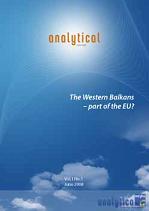DOES EUROPEANISATION EQUAL DEMOCRATISATION? APPLICATION OF THE POLITICAL CONDITIONALITY PRINCIPLE IN THE CASE OF THE MACEDONIAN SYSTEM OF GOVERNANCE
DOES EUROPEANISATION EQUAL DEMOCRATISATION? APPLICATION OF THE POLITICAL CONDITIONALITY PRINCIPLE IN THE CASE OF THE MACEDONIAN SYSTEM OF GOVERNANCE
Author(s): Gorica AtanasovaSubject(s): Politics / Political Sciences
Published by: Аналитика Тинк-тенк Организација
Summary/Abstract: The Western Balkan region has been ravaged by the forces of balkanization for more than a decade since the dissolution of the Yugoslav federation. Although geographically belonging to Europe, the Balkans has been labeled as the ‘black hole’ of the continent and often treated as the ‘constitutive other’ to Europe which has remained outside of the Europeanisation projects of the EU. However, more than a decade after the dismantling of Yugoslavia, the present image of the region gives rise to impressions of relative stability and joint commitment of the Western Balkans countries towards the future EU membership. The EU approach, on the other hand, has transformed from a failing foreign policy of conflict prevention towards a strategy for Europeanisation of the region through the Stabilization and Association Process (SAp) designed for the 5 countries in the area (Albania, Bosnia and Herzegovina, Croatia, Macedonia and Serbia and Montenegro). The purpose of the SAp process is to achieve stabilization in the region, democratization of these countries as well as to equip them for accession and future membership in the EU. The case study of Macedonia is used to examine the impact of Europeanisation process and its interrelation with the democratization endeavors of the country. The analysis focuses on the system of governance through political conditionality of the Republic of Macedonia. The paper advances the view that Europeanisation through political conditionality is an integral but not all encompassing factor for fostering genuine democratization as exemplified by the Macedonian system of governance. The paper also argues that a modification of the Europeanisation approach that takes the specificity of the context and the stateness issue into account is needed in order to build Macedonia into a future democratic member state of the EU. The case study of Macedonia provides impetus for the Europeanisation process as applied in the countries of the SAp framework and contributes academic debate on democratization in view of the process of European integration.
Journal: Analytical
- Issue Year: 2008
- Issue No: 01
- Page Range: 1-11
- Page Count: 11
- Language: English

